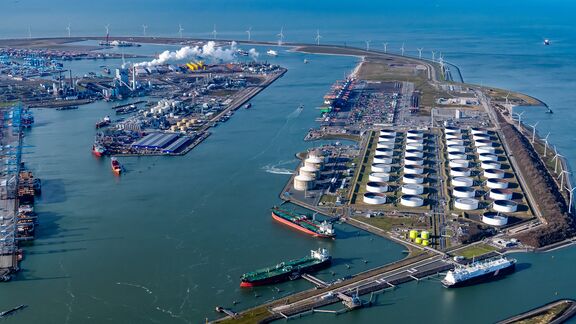Energy and climate package offers relief for Rotterdam industry
Reading time: 3 minutes
With the energy and climate package, the government is addressing the call for investments in the preservation and sustainability of Dutch industry. Together with Deltalinqs, the Municipality of Rotterdam and the Province of South Holland, the Port of Rotterdam Authority has recently emphasised the importance of this for the port.
‘The package, alongside the Spring Memorandum, demonstrates that the government is seeking to find a solution to the problems that companies are currently facing. It provides short-term relief in several areas, while incorporating significant investments for the future. At the same time, it remains essential to continue working with the government, including in the run-up to Prinsjesdag (the King’s speech), to foster a competitive investment climate in the interest of a resilient Dutch industry,’ says Boudewijn Siemons, CEO of the Port of Rotterdam Authority.

In the interim budget report, a substantial sum has been allocated to the SDE++ scheme in 2026, enabling companies to use proven technologies, such as CO₂ storage and hydrogen, to enhance sustainability. In addition, through the energy and climate package, the government will now assume the risk for Aramis, the follow-up project for CO₂ transport and storage beneath the North Sea. This makes it more appealing for companies to invest in reducing their CO₂ emissions within the port area. ‘The package certainly includes incentives for sustainability and CO₂ reduction. At the same time, companies will first assess whether they perceive sufficient prospects in the Netherlands before deciding,’ says Boudewijn Siemons.
Working towards a level playing field in Europe
The port and industry are inextricably linked to companies in the industrial zone in the triangle of Antwerp, Rotterdam and the Ruhr area. Many companies operate multiple branches across Europe. The Port of Rotterdam Authority has consistently advocated, alongside its partners, that the investment climate disparities with Belgium and Germany must be addressed to ensure that factories in the port can remain operational. The government is taking a significant step in this direction by deciding not to proceed with the proposed plastic levy. This measure would have had a significant impact on the collaborating chemical cluster, jeopardising its survival and its role in fostering more sustainable chains. The reinstatement of the Indirect Cost Compensation Subsidy Scheme (IKC) helps reduce the disparities in electricity bills compared to those in neighbouring countries.
The package makes significant strides in improving the investment climate across several areas. In other respects, companies in Rotterdam continue to face disadvantages when compared to their counterparts in neighbouring countries. This continues to place companies at a disadvantage due to the CO2 levy. The Port of Rotterdam Authority hopes there is scope to mitigate these effects in the short term, in order to preserve industry in the Netherlands, with a focus on resilience and energy security. For years, companies in the port have been grappling with uncertainty surrounding nitrogen permits. We align with the response from entrepreneurs, construction, and nature and environmental organisations that contend that the Netherlands requires a genuine solution to the nitrogen issue. Unfortunately, it appears that there is still no legally sustainable plan in place to address this.
Facilitating investments in a future-proof industry
The Port of Rotterdam Authority is collaborating with companies to ensure the industry becomes future-proof. To achieve this, it is crucial that the production and market for (green) hydrogen are established, and that the Netherlands does not face disadvantages in this area compared to other countries. By modifying the refining process, it will become more attractive to incorporate green hydrogen in fuel production. This is crucial for the advancement of green hydrogen production in Rotterdam. Furthermore, measures are foreseen to accelerate the construction of the electricity infrastructure. This is essential for enabling companies to advance and enhance their sustainability through electrification.